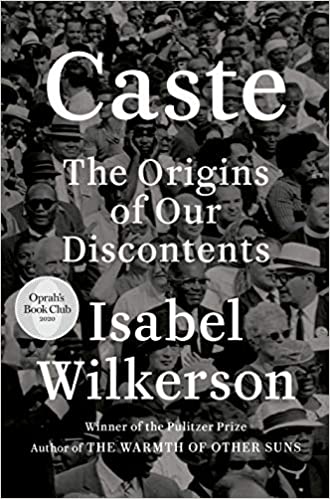Caste
The Lies That Divide Us
Isabel Wilkerson | Penguin © 2022
About the Author
Isabel Wilkerson, winner of the Pulitzer Prize and the National Humanities Medal, has become a leading figure in narrative nonfiction, an interpreter of the human condition, and an impassioned voice for demonstrating how history can help us understand ourselves, our country, and our current era of upheaval.

No review of this masterpiece on the racial underpinnings of American society can do it justice. It could easily be the most important book in print for anyone wanting to understand present day America and its long struggles with racism. Wilkerson describes a deeply embedded US caste system – not unlike India’s or Nazi Germany’s. A system deliberately built on terror and lies spanning four centuries. This unrelenting reminder of man’s capacity for evil also offers a glimmer of hope. Hope that increasing numbers of Americans will reject the absurdities of bigotry and demand equality for all.
This review addresses the author’s assertions that most white Americans are not only racially biased, but they allow those biases to influence their actions and choices. This is a charged issue, one that none of us should turn away from because it may feel uncomfortable to confront.
take-aways
- Most Americans associate the term 'caste' with India, not with their own country.
- The US, determines its political, economic, and social hierarchy mostly upon an artificial construct of race and skin color.
- Slavery and the forces of a deeply ingrained caste system permeate the lives of every American to the present day.
- Caste culture runs four centuries deep in the American psyche.
- Centuries of cultural reinforcement have influenced every important event and turning point in American history.
- The human tendency to want to feel superior, and to demonize the 'other,' makes any tolerance of racism dangerous.
- Caste and race-based systems harm everyone.
- As of 2020, more mainstream white Americans appear to have woken up to the radical unfairness of the American caste system.
Summary
The very essence of inclusion demands acknowledging that no two people are the same. You can never come to general conclusions about anyone based on their appearance, age, race, gender, etc. Everyone’s ideas and life experiences add value to the mix. People and organizations that truly embrace this truth gain incredible abundance in their lives and advantages in their businesses.
In addition to cataloguing the crimes visited on African Americans, Native Americans and others over the centuries, Wilkerson speaks to a more insidious form of racism that goes well beyond the flagrant cases that fill the news cycles today. This is where her work truly stands out.
In Caste, Wilkerson surfaces the subtle but pervasive racism that poisons the minds of most Americans. Whether you care to admit it or not, if you grew up in America, a subconscious prejudice is pounded into your psyche from the moment you start listening to adults, reading, watching TV, seeing advertisements, and even observing behaviors. In whites, blacks, and everyone else, it constantly reinforces a pecking order. One that is far more subtle, but still similar to the caste system in India.
“By adulthood, researchers have found, most Americans have been exposed to a culture with enough negative messages about African-Americans that as much as 80 percent of white Americans hold unconscious bias against black Americans.”
There are no untouchables in America. But Wilkerson uses data and evidence to make a compelling argument that consciously or not, a majority of white Americans yearn to protect privilege for themselves and their children. Indeed, the majority of white Americans voted against Obama in 2008 and 2012, and for Trump in 2016 and 2020. They may not have voted ‘against their interests’ as many have asserted; rather, they placed their primary interest first – maintaining the caste system.
Wilkerson acknowledges that for most white Americans, privilege is a subconscious force – at least most of the time. Yet this caste system delivers a heavy cost to the oppressed and to everyone else. Beyond the rampant and reckless actions of some police officers, African Americans at all socio-economic levels live, on average, shorter lives and suffer higher rates of diabetes, heart disease and high blood pressure than do whites. Even African Americans who have scaled the heights of business, politics, academia, professional sports, and entertainment feel the indignities of a caste system that, in its subtleties and realities, often robs them of their freedom to do many things that whites take for granted.
“Caste is the infrastructure of our divisions. It is the architecture of human hierarchy, the subconscious code of instructions for maintaining a four-hundred year-old social structure.”
Wilkerson argues that the subtle forms of racism that many African Americans endure daily constitute small cuts that gradually kill the body, mind, and soul. But the costs extend to the majority as well, who must live in a country that won’t provide adequate healthcare for a large swath of its citizens, where school results fall far behind those in other wealthy nations, where more people are imprisoned than in any other place on earth, and where a higher percentage of babies and mothers die in childbirth than in almost any other industrialized country. Worse, perhaps, just as professional sports once left much of the best talent on the sidelines, American business, science, medicine, and scholarship still suffers by effectively excluding a significant segment of the nation’s potential.
Wilkerson reminds us that this caste system persists, in part, because each and every one of us allows it to in large and small ways. You may not elevate or demean, embrace, or exclude on the basis of people’s physical traits, but Wilkerson forces you ask harder questions of yourself, like whether you advocate for the removal of racist statues and symbols, join protests over the injustices of race-based brutality, or really do anything tangible at all to make America a more equitable place for everyone.
“Erwin Rommel was a great general, but there are no statues of Rommel in Germany.”
Wilkerson doesn’t address it directly in her book, but a renewed consciousness appears to be rising again in America, this time perhaps louder and more universally than in the past. With luck, she believes, an American Truth and Reconciliation process might form, in which the evils of the nation’s racist underpinnings can be aired and discussed, and where a new empathy might emerge alongside the realization that caste structures harm everyone, and that equality does not somehow reduce or diminish anyone.



